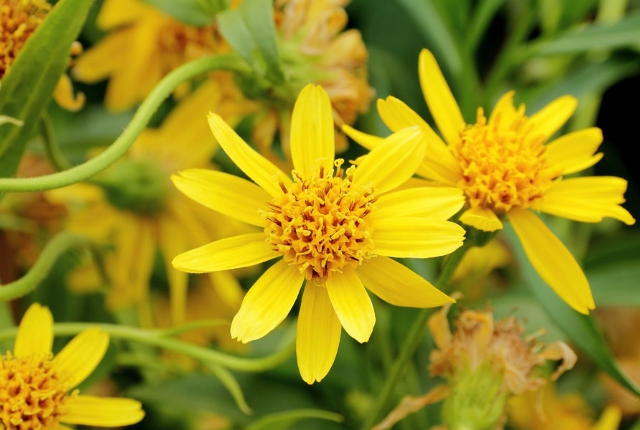
Don’t be fooled by arnica’s pretty face. The attractive daisy-like flowers of this mountain herb contain toxic compounds that could send blood pressure sky high and cause permanent heart damage. So neither distilled oils from arnica nor infusions made from its dried flowers should ever be taken by mouth. But for external use, arnica is surprisingly effective for muscle soreness, bruises and sprains. So if you’ve had any sort of minor accident or sports injury, arnica is a good herb to turn to for relief.
What’s it good for?
- bruises
- bruises and tendinitis
- carpal tunnel syndrome
- foot pain
Banish bruises, eliminate aches
Arnica has received the stamp of approval from Germany’s Commission E – regarded as the world’s leading authority on the safety and effectiveness of herbs – as an external treatment for bruises as well as muscle aches and pains. Never take arnica internally (unless as a homeopathic remedy when it is too diluted to cause any harm), or use it near the eyes or mouth, or near an open wound: It’s poisonous.
You can buy arnica in gel, cream, ointment and tincture forms. It is most effective for:
- Healing bruises Arnica erases bruises by helping the body to reabsorb blood that has seeped into the tissues. A cream or ointment containing 5 to 25 per cent arnica extract, applied several times a day, reduces pain and swelling – along with that ugly dark purple bloom. If you prefer to use the tincture form, mix 1 part tincture with 3 to 10 parts water, soak a clean cloth in the liquid and apply to the bruises. Two of the chemicals in arnica, helenalin and dihydrohelenalin, have painkilling and anti-inflammatory properties when absorbed they are through the skin. You can also take 1 or 2 tablets of the homeopathic remedy Arnica 30c as soon as possible after you’ve bumped yourself to minimize bruising. Follow the dose instructions on the label.
- Soothing sprains and strains Because it curbs inflammation, arnica is perfect for treating mild sprains and strains. It may also improve circulation, increasing the flow of healing nutrients into sore muscles while removing certain by-products of injury – such as lactic acid – that cause pain. Arnica also helps to relieve pain. Because arnica is poisonous when it is inside the body, it must not be used on broken skin.
- Looking after the footsore Do your feet hurt at the end of the day? Try soaking them in a warm footbath to which you’ve added a tablespoon of arnica tincture. The improved bloodflow almost instantly results in less pain.
Watch out for rashes
Most people can enjoy the benefits of arnica without any side effects. However, if you are allergic to helenalin, one of the active chemicals in arnica, then regular use of the herb can result in contact dermatitis, a harmless but extremely irritating skin rash. This is most likely to occur in people who use the herb often or apply an overly strong tincture to the skin.
If you are allergic to chrysanthemums or other members the aster family (Asteraceae), you need to avoid arnica, which is a member of the same flower family.
Cautions and Side Effects
Do not take internally, and do not apply to broken skin. Avoid in pregnancy. Can cause an allergic rash in sensitive people or with prolonged use.